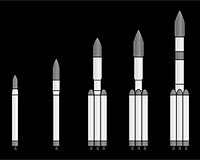 |
Los Angeles CA (SPX) Nov 25, 2009 A nondescript sign along an anonymous road east of Dallas announces the location of bustling and urbane Caddo Mills Municipal Airport (former home of Southwest Soaring, phone number now obscured by time or paint). A passing traveler might overlook the large white hangar with the doors wide enough to admit the reaching wings of delicate glider planes. Parked among the slumbering agricultural equipment and looking like yet another oversized bale of plastic-wrapped hay is a trailer-mounted tank of cryogenic methane. A refrigerated tank of LOX (liquid oxygen) hides bashfully in the shade of a dainty tree. The rain and wind beat down the unmown prairie grasses and form puddles on the narrow entrance road. This is the home of Texas' most unusual rocket company, Armadillo Aerospace. All that outwardly heralds the presence of the company is a small sign over a few windows looking in on a sparse lobby decorated with a few trophies. Like a mad scientist's secret hideout, there is no obvious sign of the genius and frenetic activity going on inside the cavernous space. On a gloomy rainy day, I dropped by Armadillo to see firsthand the advances being made by an eclectic team of rocket visionaries. Nine-year-old Armadillo is 100% owned by John Carmack, famous video-game developer of the well-known and highly-profitable Doom and Quake franchises. Armadillo has for its life so far, been a non-profitable endeavour, consuming around 4 million dollars of Carmack's own money along with various grants, awards and sponsorship monies. A team of eight (mostly volunteers but three full-timers) toils each week at pushing commercial spaceflight to where it has never gone before: affordability and availability. Traditionally, lofting a pound of anything into space has been inordinately expensive, putting it mostly out of reach of anyone other than governments and large corporations. NASA's space shuttle, originally intended to democratize space access hoped to achieve a fantastic cost-per-pound of USD$590 (in 2009 dollars). In practice, the huge infrastructure required by the shuttle pushes this to an estimated $23,000. Less-expensive unmanned systems like the air-launched Pegasus XL achieve costs of $4,300 per pound. Russian launchers offer tantalizing prices as low as $1,400 per pound as long as you're launching 30,000 pounds. Many in the space industry foresee an event-horizon looming in the utilization of space, triggered by a dramatic reduction in the cost of lifting loads into various orbits. Tourism, research, commercial manufacturing and exploration all become more economical and feasible as the cost of space access drops. The semiconductor field has already demonstrated the profound changes caused by order-of-magnitude drops in the cost of technology and the commercial space industry is eager to follow on the heels of Moore's Law.
Download the article in full - PDF file 2.5MB Share This Article With Planet Earth
Related Links Download the article in full - PDF file 2.5MB Armadillo Aerospace Rocket Science News at Space-Travel.Com
 Russia Could Delay Maiden Launch Of Angara Rocket
Russia Could Delay Maiden Launch Of Angara RocketMoscow, Russia (RIA Novosti) Nov 20, 2009 The maiden launch of Russia's new Angara carrier rocket could be postponed for at least one year due to shortage of funds from the Defense Ministry, the top Russian space official said Wednesday. The Angara rocket, currently under development by the Khrunichev center, is designed to put heavy payloads into orbit. The launch facilities were expected to be finished by 2010, and the first ... read more |
|
| The content herein, unless otherwise known to be public domain, are Copyright 1995-2009 - SpaceDaily. AFP and UPI Wire Stories are copyright Agence France-Presse and United Press International. ESA Portal Reports are copyright European Space Agency. All NASA sourced material is public domain. Additional copyrights may apply in whole or part to other bona fide parties. Advertising does not imply endorsement,agreement or approval of any opinions, statements or information provided by SpaceDaily on any Web page published or hosted by SpaceDaily. Privacy Statement |